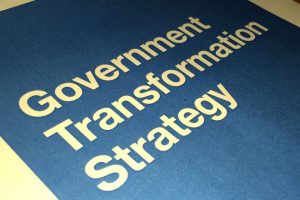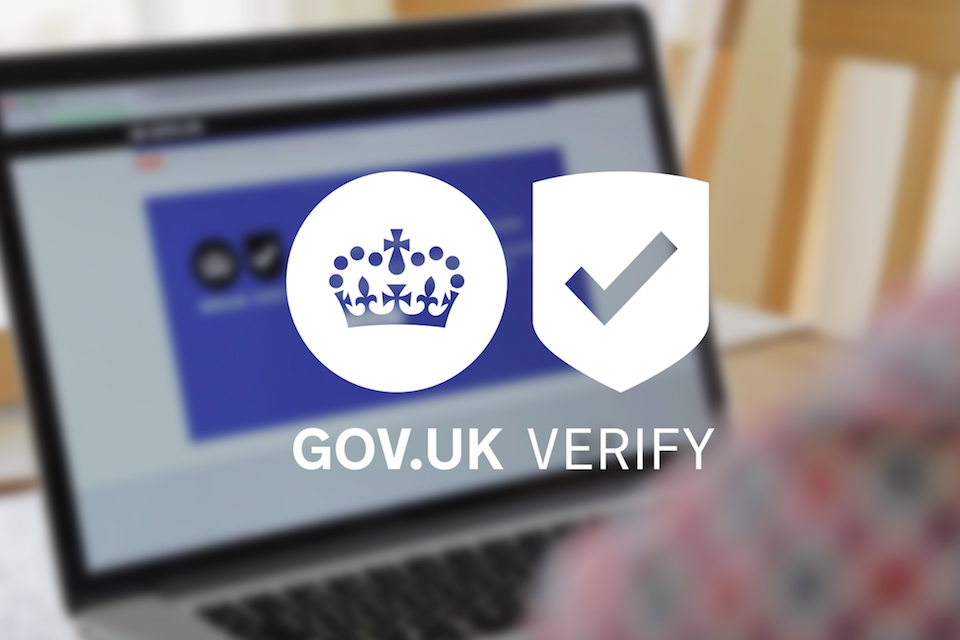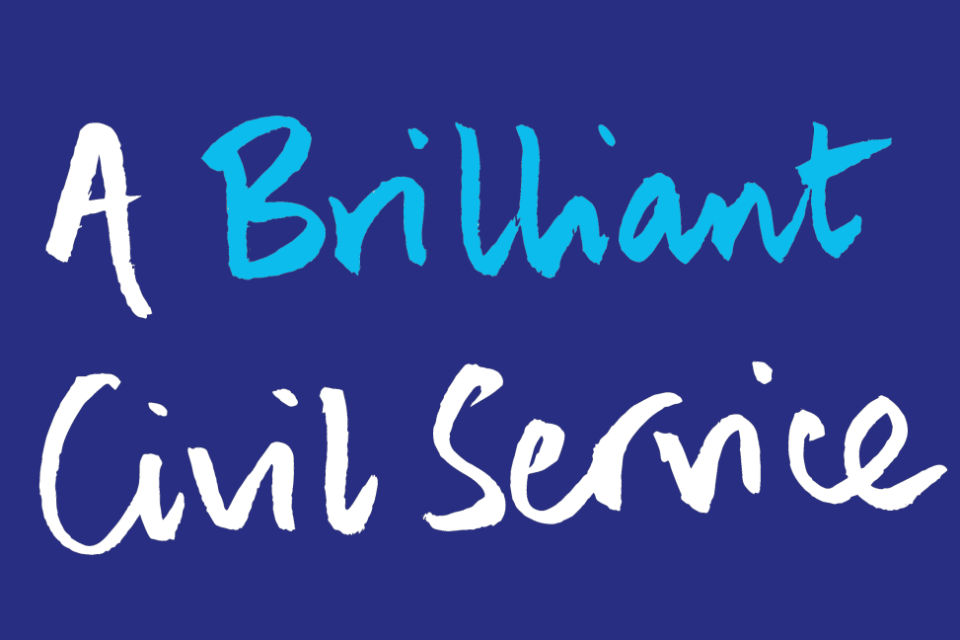
Today, the Minister for the Cabinet Office announced the launch of the Government Transformation Strategy 2017 to 2020. This is a vital step in creating a digital government that is responsive to the needs of citizens and meets their expectations of modern public services.
The strategy sets out how a digitally enabled government will transform the way we work, how we organise ourselves and how we interact with the citizens we serve.
We’ve already demonstrated the potential for the digital transformation of public services through the work carried out under the 2012 strategy. We’ve redesigned and rebuilt some of the most used services, including Register to vote, View driving licence and Carer’s Allowance. For the first time, digital professions have been established across the public sector, increasing our capability in this crucial area. And strong foundations have been laid for departments to share digital platforms, components, code and best practice for building user-focused services.
 The cross-departmental collaboration behind the 2017-2020 strategy is the start of what we hope will be a new way of working. We know that the digital transformation needs to be embedded deeper than ever before. Making sure that data can flow easily between departments, allowing us to build joined-up services that run seamlessly across government, has a major part to play in this. This will be how we start to reshape the relationship between citizen and state, putting power into the hands of the citizen.
The cross-departmental collaboration behind the 2017-2020 strategy is the start of what we hope will be a new way of working. We know that the digital transformation needs to be embedded deeper than ever before. Making sure that data can flow easily between departments, allowing us to build joined-up services that run seamlessly across government, has a major part to play in this. This will be how we start to reshape the relationship between citizen and state, putting power into the hands of the citizen.
To achieve this we have arranged our strategy into five main themes. We will focus on:
- business transformation: continuing to design, develop and deliver world-class digital services and a government that operates in a modern and efficient way, from front-end service delivery to back-office administration
- skills and capability: developing the right skills and culture among our people and leaders, and bringing together policy and delivery to design services that are focused on outcomes for citizens, and provided in an iterative environment, learning from experience and evidence
- enabling the Civil Service to deliver: providing better tools and processes to make it easier for public servants to work effectively, including up-to-date workplace IT and digital tools, improved human resources processes, and common technology across the public sector
- data: making better use of data – not just for transparency, but for collaboration across government that will allow us to build joined-up services
- shared platforms: creating, operating, iterating and embedding good use of shared platforms for government services
 and reusable business capabilities to speed up transformation – we will also be accelerating the development of GOV.UK Verify, the online service that enables users to prove their identity and access government services securely, working towards 25 million users by 2020
and reusable business capabilities to speed up transformation – we will also be accelerating the development of GOV.UK Verify, the online service that enables users to prove their identity and access government services securely, working towards 25 million users by 2020
This is an ambitious agenda. Collaboration across government will not always be simple. However, we’re confident that the goals of digital transformation are shared across government. The role of the Government Digital Service (GDS) will be to support, enable and assure departments in meeting these goals.
Transformation is a continuous process. We will always be looking to improve, because the expectations of citizens and the demands on services will always be shifting. But in government there is a clear need to measure progress and be accountable for the work we’re doing. And we need to show that meaningful changes are being made that better equip us to respond to the challenges we face.
 For this reason, we’ve set ourselves some milestones. The plans detailed in the strategy are set to be complete by 2020. But we know 2020 is not the finish line. The strategy will lay a foundation for the digital government of the future: a government that is adaptable and flexible enough to keep pace with changes in society and technology. We’re already planning for the things we’ll do beyond 2020, and we’ll keep you updated as we go.
For this reason, we’ve set ourselves some milestones. The plans detailed in the strategy are set to be complete by 2020. But we know 2020 is not the finish line. The strategy will lay a foundation for the digital government of the future: a government that is adaptable and flexible enough to keep pace with changes in society and technology. We’re already planning for the things we’ll do beyond 2020, and we’ll keep you updated as we go.
In the next few months, the dialogue around the strategy will continue on the GDS Roadshow as we travel around the country to hear what you, the civil servants who will be making the transformation a reality, have to say.

16 comments
Comment by We can do it. posted on
This could not have been done sooner. Having recently left the private sector to join public services, we are far behind the capabilities we are permitted! I have read all comments and understand the barriers - but this is not the first time large scale organisations have made this shift. We can learn from industry - however, we need to be at the cutting edge of new developments to make our services the best they can be. For staff and those we serve. Ultimately, it is a positive attitude that will make this a success.
Comment by Graham posted on
As we race to digital,can I just remind people that not everyone is easy with computers and some still dont possess them.Particularly as they get older.
As an aid they are ,to me ,with my limitated skills (part age,part disability), fantastic. ...but not everyone.
As a replacement to cut costs not so good in the long run.
Helen says the unsayable and is worth repeating.
The transfer of the costs of printing and forms and admin to the users who are expected to sustain all the new costs of ongoing internet connection, printing and security updates and risks .
I heard that future audits will all be electronic.Im trusting that the announcer got carried away, as from past experience Ive a feeling that only the books people want us to see will be sent.
Comment by Morag posted on
Demanding that claimants be connected to the internet is penalising the poor and the vulnerable. Charging 45p per minute for phonecalls to UC Service Centres is ridiculous.
I called the service centre and it cost me £5, a meaty portion of your weekly allowance of £73.10pw ESA(cont) only.
Nothing changes although these points have been brought up again and again - lets make the customer the centre and stop extorting money from them and start helping them.
Comment by Richard posted on
We may be pushing the Digital Agenda internally, which is great, but we need to look after the customers too. In the DWP we are about to remove about half of our customer-use internet access machines and are not replacing them with anything else. For those that do not have digital access to all of Government's wonderful new sites, this is only going to make things worse. Cart and horse?
Comment by Narendra posted on
We need to look at how to support customers with limited IT skill who are claiming or want to claim Universal Credit... There are customers who have never used a computer and now are having to do everything digitally. We have provided customers access to the “WADs” however I feel these are not user friendly… Lots of our customers are having problems with logging into their passwords, updating their account, setting e-mail. Enormous time is wasted making reclaim if the claim is closed when the customer fails to carry out the task/action.
Comment by Simon Wright posted on
I applaud the strategy, I really do but I do wonder about the realities of funding and resource? My reality is constant delays for a smartphone - was originally last summer then September and still waiting. Also the queue for a Surface Pro seems never ending. "Not enough .. haven't got the resources .. have to wait..." I have a mobile job and I'm constantly frustrated by my inability to access email on the move. One step at a time seems a better approach.
Comment by FRUSTRATED DWP EMPLOYEE posted on
I hope this joined up Government vision will make it easier to share intelligence in relation to fraud. We miss huge opportunities to share information where, for example benefit fraud is being committed which often crosses into boundaries of tax credit, income tax losses and sometimes immigration issues. However trying to share this information with HMRC, Home Office etc is impossible, the channels are just not there. It's crazy in this day and age that we let this situation continue and the public purse suffers. Can you imagine this in private industry? I hope this will be addressed as part of the new vision.
Comment by Roger posted on
Interested to hear the use of the term 'shared platform' as this is exactly the term that I used some weeks ago when speaking about how to share documents between RPA, Natural England and the Forestry Commission. The problem is that we cannot wait five years whilst it is talked about and it is difficult to find someone who really has any knowledge on the subject. The normal response is to go to our software suppliers who then quote extortionate prices to provide us with a solution. And there lies the nub of the problem; yes it can be done but as soon as we get near the finishing line we will all be denied access because our departments cannot afford the necessary licences.
Comment by stuart posted on
So the problem is paper and conversations?
Comment by TRACY DEWHURST posted on
All great and very welcome stuff Kevin. I also applaud the push to improve digital skills within schools which was outlined in the news over the weekend, but very concerned that nothing will be changing with the curriculm until at least 2022. How does this work fit with and align with that?
Can I ask what's happened to the digital academies within this work and why can't we use the training developed within DWP (or investigate what they use in India where most of the software developers are recruited from) for the school curriculum now to ensure that we have our coders and software developers in the future? 5 years to introdcue it into the curriculm seems a long time. Shouldn't we have a Software Tsar to make sure, particularly for Brexit that we start to develop these skills now, not later when it's too late .... Just an observation ......
Comment by Helen posted on
This is all about aspects of efficiencies irrespective of the differring needs of different parts of the public. It in effect transfers the defunct costs of printing and sending forms and admin to the users who are expected to sustain all the new costs of ongoing internet connection, printing and security updates and risks . Accessing the systems is difficult from public librairies, either they are now increasingly closing or the demand for access to terminals is too great and personal information is at risk in a public setting. The old , infirm, poor ,or otherwise digitally challanged are being ignored or platitudes are utttered about helping them. Digital is a new tax for access. The state should pay all individuals costs/overheads for gov related internet access and provide a supervised and secure solution for the vulnerable.
Comment by Bill posted on
Can I be the first to ask to be upgraded from a Windows xp machine, running Office 2003 please?
If this is world class, what is worse?
Comment by Sophie posted on
Bill - with MODNet being progressivley rolled out, how have you not been upgraded to Windows 7? Are you in a very remote location?
Comment by philby posted on
This is third-world class...
New initiatives are pushed through without adequate testing and when problems turn up, we are told "there's no money to rewrite it so it works. Just use it".
Comment by C posted on
If your going to do something, could you please properly consult the people that actually have to work with it on a daily basis , and actually listen to what they say they need and provide it.
Comment by UB40 posted on
C - Couldn't agree more, consult the users and those in technology roles that have to work with these systems. The forthcoming Defnet is a prime example of this - no consultation with the people that matter. Poor technology, no guidance and no consultation with those that matter.